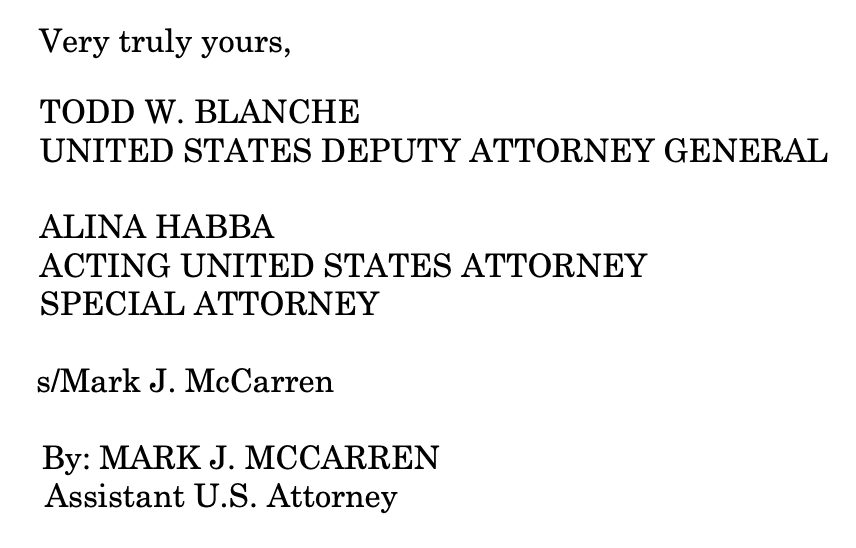Kash Patel Yapped His Mouth with a REAL Feeb
There’ll be a lot of good articles on this lawsuit that three recently fired senior FBI agents — Brian Driscoll, Steven Jensen, and Spencer Evans — have filed against Kash Patel, Pam Bondi, and the agencies that fired them. For example, NYT focuses on disclosures about Stephen Miller’s role in running DOJ. NPR focuses on Dan Bongino’s obsession with social media.
The complaint retells stories already reported in the press, such as how the Trump Administration intended to hire Robert Kissane as interim FBI Director but fucked up the announcement, so Driscoll served instead. There are descriptions designed to be embarrassing — if not debilitating to Kash’s ability to lead the agency — such as the revelation that Kash has a collection of whiskey and cigars in his office and that Kash’s challenge coin that is unusually large. The audience for such disclosures goes beyond Judge Jia Cobb, who’ll preside over the case, to members of Congress who’ll hold hearings with Kash just days from now.
These details discrediting Kash’s leadership are matched by details describing how these men, especially Driscoll, were fired because of their efforts to treat FBI agents with respect and dignity, intervening to prevent firings or mitigate the impact of them. A long passage describes Driscoll’s efforts to undercut Emil Bove’s jihad against agents who–like Bove and Driscoll themselves–had participated in the January 6 investigation. This includes an anecdote about how Bove bolloxed an attempt to send an email to the entire FBI workforce to complain about Driscoll.
This is a speaking complaint written by people who’ve helped write their share of speaking indictments in their careers.
Which is why my favorite line is the one describing Kash acknowledging that these firings could lead to his deposition: “[Kash] again commented that he knew the nature of the summary firings were likely illegal and that he could be sued and later deposed.” [my emphasis]
The deposition comment, as it pertains to Kash, appears twice in the lawsuit: once at the beginning, to substantiate that Kash knew these firings were unlawful, which the complaint immediately contrasts with the sworn promises Kash made to the Senate not to politicize firings.
4. Patel openly acknowledged the unlawfulness of his actions. On or about August 5, 2025, in a conversation with Driscoll, Patel plainly stated the reasoning behind his firing of FBI employees that Mr. Driscoll sought to defend. In sum and substance, Patel admitted that his superiors, who he referred to as “they” and who Driscoll understood to include Defendant Department of Justice (“DOJ”) and the White House (which encompasses Defendant Executive Office of the President (“EOP”)), had directed him to fire anyone who they identified as having worked on a criminal investigation against President Donald J. Trump. Patel explained that he had to fire the people his superiors told him to fire, because his ability to keep his own job depended on the removal of the agents who worked on cases involving the President. Patel explained that there was nothing he or Driscoll could do to stop these or any other firings, because “the FBI tried to put the President in jail and he hasn’t forgotten it.” Driscoll indicated his belief that Patel’s reference to his superiors meant DOJ and the White House, and Patel did not deny it.
5. When Driscoll explained that firing employees based on case assignments would be in direct violation of internal FBI processes meant to adjudicate adverse actions and prevent retaliation based on case assignments, Patel said that he understood that and he knew the nature of the summary firings were likely illegal and that he could be sued and later deposed.
6. Patel’s actions stood in stark contrast to his sworn testimony during his confirmation hearing before the Senate Judiciary Committee. There, he assured the Committee and the country that “all FBI employees will be protected against political retribution.” An exchange with Senator Richard Blumenthal on the topic of firing agents who worked on criminal investigations involving President Trump proceeded as follows:
Sen. Blumenthal: You’ve committed that the FBI will not be politicized. So here’s your first test. Will you commit that you will not tolerate the firing of the FBI agents who worked with the Special Counsel’s Office on these investigations? . . .
Patel: Senator. Every FBI employee will be held to the absolute same standard, and no one will be terminated for case assignments.
7. Likewise in his written responses to a Senate Questionnaire, Patel repeatedly emphasized his commitment that “personnel decisions should be based on performance and adherence to the law” and that “every FBI employee will be held to the absolute same standard, and no one will be terminated for case assignments.” He also asserted that he would “ensure that the appropriate processes are always followed” with respect to adverse actions against FBI personnel.
The lawsuit repeats the deposition comment twice in a longer passage where Driscoll describes how he was fired because he attempted to prevent the firing of another agent, Christopher Meyer, who had been assigned to pilot Kash’s frequent flights back to Las Vegas.
169. On or around August 1, 2025, FBI Supervisory Special Agent Chris Meyer became the subject of intense social media activity. Specifically, various social media posts claimed incorrectly that Meyer had been the signatory to the Mar-a-Lago search warrant affidavit and was now Patel’s personal pilot.
170. In fact, Meyer was not the signatory to the Mar-a-Lago search warrant affidavit. He was not the case agent for the investigation concerning President Trump’s handling of classified documents, nor did he participate in the search of Mar-a-Lago.
[snip]
173. On Saturday, August 2, 2025, the FBI’s Associate Deputy Director and Chief Operating Officer Will Rivers called Driscoll to ask him for details about Meyer. Meyer is a military veteran and a qualified pilot. As part of his duties with the FBI, he flew the FBI’s private jet, a Gulfstream G550, which means he served as the FBI Director’s pilot while on duty. Along with those duties, Meyer—and all of the G550 pilots—also flew HRT personnel to overseas missions and other mission-critical assignments. HRT is also responsible for flying “Foreign Transfer of Custody” missions, which detains and transports terrorists and criminals from overseas to the United States to face criminal prosecution. In short, each pilot in CIRG plays an essential role in critical FBI missions.
174. Rivers wanted to know Meyer’s current location and whether he was flying the Director on his current trip. He also asked Driscoll about Meyer’s tenure with the FBI, which was approximately 13 years. Rivers told Driscoll that Meyer was no longer permitted to fly the Director’s plane.
[snip]
179. At this point, Driscoll demanded an opportunity to speak with Patel in person, to which Rivers agreed. Driscoll scheduled a meeting with Patel for Tuesday, August 5, 2025.
180. Driscoll later spoke with Meyer over the phone and informed him that he would no longer be allowed to pilot Patel’s aircraft. Driscoll also told Meyer that he would be raising the issue with the Director and would challenge the decision.
181. On Monday, August 4, 2024, Driscoll received a call from Bongino. Bongino asked Driscoll if anybody would be able to “find anything” in his emails from the time he (Driscoll) was serving as Acting Director. Driscoll replied that there would be nothing incriminating to find in his emails during this time and took Bongino’s question to mean that somebody besides Bongino and Patel would be searching through his old emails in an attempt to find a basis for firing him. Bongino said that he would attempt to keep Driscoll in place.
182. On Tuesday, August 5, 2025, at 9:00 a.m., Driscoll again met with Rivers. This meeting included a status update on Meyer.
183. At 10:00 a.m. on August 5, 2025, Driscoll met directly with Patel to discuss Meyer. Specifically, Driscoll stated that summarily firing Meyer would be illegal based on his military veteran status and would also violate all established FBI policies for adverse actions against personnel.
184. Patel responded that Meyer would be fired by Friday, August 8, 2025, and that there was nothing either Patel or Driscoll could say or do that would stop it. Driscoll pointed out that Meyer had not committed any misconduct and that being assigned to cases could not be grounds for termination. Patel said he understood this, but that as Driscoll should know from “sitting in this seat,” meaning serving as the Director, that “you can’t save everyone.”
185. When Driscoll explained it, Patel acknowledged that the FBI would be sued and would lose in court. He also acknowledged that he would likely be deposed concerning his knowledge of the reasons for Meyer’s termination. He also acknowledged that the FBI workforce would likely respond negatively to Meyer’s termination.
186. Patel stated that all FBI employees who they identified who had worked on the cases against President Trump would be removed from their jobs, regardless of their retirement eligibility status. He then stated that Driscoll needed to understand that “the FBI tried to put the President in jail and he hasn’t forgotten it.” Patel then stated that his own job depended on the removal of the agents who worked on the cases against the President, regardless of whether the agents chose to work on those cases or not. Patel acknowledged that this would be in direct violation of internal FBI processes meant to adjudicate adverse actions and prevent retaliation based on case assignments. He again commented that he knew the nature of the summary firings were likely illegal and that he could be sued and later deposed. [my emphasis]
There’s even the equivalent passage where Steven Jensen staved off Walter Giardina’s firing for some months by warning Dan Bongino that he might face a deposition.
130. At some point in May 2025, Jensen received a phone call from Bongino, who was audibly upset. He asked Jensen whether he knew who SA Walter Giardina was and told Jensen that he has “got to go.” Giardina was an agent assigned to WFO. Jensen asked him to elaborate, but Bongino explained that he could not do so over the phone. Jensen met him at FBI Headquarters to continue the discussion. Jensen knew Giardina to be a dedicated and hardworking FBI agent who was assigned to high-profile investigations into members of both political parties because of these qualities.
131. Upon arriving at FBI Headquarters, Jensen found Bongino in his Chief of Staff’s office. Bongino looked as if he had not slept for several days. He seemed extremely anxious and agitated. Jensen asked him what was wrong. Bongino explained that he had found a room filled with classified documents and “burn bags” related to the now-closed Crossfire Hurricane investigation. He expressed shock at the existence of these burn bags.
132. By his comments, it seemed to Jensen that Bongino might not have been fully aware that the use of “burn bags” is a standard method across multiple federal agencies for preparing classified material for destruction when an investigation is deemed closed, or when physical copies of the materials are no longer necessary. He also appeared unaware that the FBI also stored digital copies of materials on the FBI’s classified computer system, and that this was likely the case with these materials. At the meeting, Bongino also made an unfounded additional allegation about Giardina’s handling of data, claiming that the allegation was “just out there.”
133. Bongino insisted that Jensen summarily fire Giardina. Jensen explained that Giardina was a military veteran and was entitled to certain rights which did not allow such a firing. He explained that if Bongino forced him to summarily fire Giardina, he would document in a report that the firing was at the direction of Bongino and had occurred after Jensen explained why the firing violated FBI procedures and Giardina’s rights. He explained that Bongino would likely be deposed in a lawsuit should Giardina choose to challenge his unlawful firing. Bongino did not pursue further his demand that Giardina be summarily fired in that meeting. In fact, Giardina was never assigned to work on Crossfire Hurricane. [my emphasis]
Note the similarity between these two conversations: in both, FBI’s top officials ordered their subordinates to fire someone based — at least partly — on false premises, shit floating around on social media (involvement in the Mar-a-Lago search in Meyer’s case, involvement in Crossfire Hurricane and mishandling data in Giardina’s case, both marked in blue). Both involve military veterans whose status prohibits certain kinds of firing (marked in red). In both, the subordinate gave warnings that such firings would be illegal (marked in green); Kash repeatedly acknowledged he knew those firings would be illegal.
Both of these exchanges, as described, were set up like witness interviews, where FBI agents know how to repeatedly get the core admission from the subject.
There’s some question whether Jensen and Driscoll documented these exchanges and if so how. Jensen said he would document the conversation if Bongino went ahead and fired Giardina in May, which he did not do. A footnote explains,
3 The facts alleged in this section are based primarily on the firsthand knowledge, best recollections, and/or communications of and involving Plaintiffs. Unless otherwise indicated with quotation marks, descriptions of conversations and other oral statements are reflected in sum and substance and to the best recollections of Plaintiffs.
That doesn’t explain what kind of documentation each man made of the conversations or when. Both men know well the lesson of Jim Comey, whose attempt to take official notes with him after he was fired was criminalized over the course of years. But both men were also trained, over decades, to write 302 reports after the fact that would be deemed reliable in court.
In any case, Driscoll makes sure to name the witnesses to various parts of this progression: The conversations with Will Rivers on August 2 and — just before the conversation with Kash — on August 5. The phone conversation with Bongino on August 4. Details of timing that would show up in phone records and official calendars.
These are men who know how to substantiate a case, and in the case of these crucial conversations, did so.
Which is why the warnings about the depositions are so delicious.
It actually is hard to demand that FBI Directors and their Deputies sit for a deposition. There’s a whole body of precedent that requires plaintiffs to work their way up to more senior officials. For example, Peter Strzok (the circumstances of whose firing and subsequent lawsuit, which made some of the very same First Amendment and Due Process claims, Driscoll and Jensen presumably also know well) had to fight hard to get Chris Wray to sit for a deposition, and even harder to get Trump to sit for one.
But here, the plaintiffs have the defendants on the record noting that they would have to sit for depositions.
The depositions themselves would be worse than embarrassing. They would record:
- Both men’s rank ignorance of FBI processes
- The erroneous social media conspiracies that dictated firings of highly qualified FBI agents
- Acknowledgment — laid out elsewhere in the complaint — by both Bongino and Kash that these men were doing their jobs competently
- As noted, the knowledge of all the reasons why the firings of Giardina and Meyer, as well as those of the plaintiffs, were illegal (note, at least per the biographies in the complaint, none of the plaintiffs are veterans entitled to special treatment on firings)
In that first instance, the warning about the deposition does something else.
The White House is a defendant in this lawsuit. The basis for that rests in part on Emil Bove’s repeated explanations that Stephen Miller was ordering up the FBI firings and specific references to White House involvement that both Bongino and Kash relayed to Jensen. But it also rests in that question — again, from a trained FBI agent — about who Kash meant by “they.” “Driscoll indicated his belief that Patel’s reference to his superiors meant DOJ and the White House, and Patel did not deny it.”
Again, this may help plaintiffs clear a hurdle that also proved onerous for Strzok and Andrew McCabe when they tried to pierce the orders the White House gave to politicize the FBI. Effectively, Driscoll already got the concession that he would have had to get in a deposition to start asking for details on — say — Stephen Miller’s role in all this, to say nothing of Kash’s understanding (and this is one of the few things put in quotation marks) that, “the FBI tried to put the President in jail and he hasn’t forgotten it.”
Kash, because he ran his mouth, may have made it easier to demand a deposition of President Trump in this case.
And finally, there’s the contrast between the concession that he might have to sit for a deposition with the sworn promises that Kash made to get confirmed. Kash already has a history of false claims that got him in legal trouble, with the grand jury testimony that he succeeded in burying during his confirmation. But here, the plaintiffs have dangled the threat of posing one set of sworn statements — that no agents would be fired for the cases they worked — with the admissions Kash already admitted he might have to make in a deposition.
To be sure, this case still faces the same hurdles and delays that both McCabe and Strzok faced (Strzok is still waiting to hear whether his case will go to trial). But because neither Bongino nor Kash could acquit themselves competently when interacting with men who had spent years doing certain FBI agent things, they’ve already backed themselves, and the people — “they” — who ordered these firings, into certain corners.



















